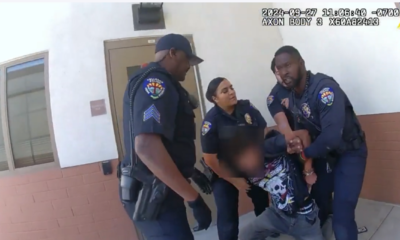April Ignacio
Biden Acknowledges Dark Past: An Apology for Native American Boarding Schools

In a groundbreaking move, President Biden is poised to deliver a historic apology to Indigenous communities for the federal government’s past actions concerning Native American Boarding Schools. This event is scheduled to take place on Friday at the Gila River Crossing School in the Gila River Indian Community, located near Phoenix.
The forthcoming apology stems from an investigation initiated by Interior Secretary Deb Haaland three years ago, which marked the first formal inquiry into the abusive practices prevalent in these boarding schools. The investigation yielded a comprehensive report that included eight recommendations aimed at promoting healing within tribal communities, with a significant emphasis on government accountability.
Haaland expressed her excitement regarding the upcoming apology, noting the dedication of many individuals who have continuously advocated for recognition of the harms inflicted by these institutions. “It’s incredibly meaningful,” she remarked, highlighting the Road to Healing tour that allowed her department to hear firsthand the painful stories from boarding school survivors and their families.
Through the investigation, more than 400 boarding schools and over 70 burial sites were identified across the nation. In Arizona alone, the government operated 47 of these schools, forcibly removing Indigenous children from their families in attempts to assimilate them through education, often accompanied by physical punishment.
The emotional scars left by this system run deep. As Haaland noted, many Indigenous people have suffered the erosion of their culture, language, and traditions due to these boarding school policies. “This is an incredibly suppressed history that so many people didn’t know about, and now it’s seeing the light of day,” she added, underscoring the importance of healing in the aftermath of such trauma.
On October 25, Biden’s visit to Indian Country will coincide with this momentous apology. Gila River Indian Community Governor Stephen Roe Lewis emphasized the significance of this gesture, particularly for elders who survived the boarding school experience. “For them, this moment is truly powerful and redemptive,” he stated, highlighting the broad implications of the president’s acknowledgment of a painful historical reality.
The upcoming apology also reflects a larger movement toward recognizing the injustices faced by Indigenous peoples across America. “It was an outright assault and genocide that our communities went through for centuries, and we’re still here,” Haaland asserted. This sentiment resonates deeply within Indigenous communities that have faced systemic marginalization.
April Ignacio, co-founder of Indivisible Tohono, hailed the impending apology as a critical acknowledgment of the harmful policies that impacted generations. She articulated the need for reparations as part of the broader movement toward healing and restitution. “This apology is long overdue, and the impact the Boarding School era had on our loss of culture and language must be tied to immediate action,” Ignacio stated.
Reflecting on her family’s legacy of survivors, Ignacio underscored the significance of Biden’s apology, aligning it with his commitment to respect Indigenous sovereignty. “This historical acknowledgment will be a part of his legacy,” she asserted, emphasizing the need for continued advocacy in addressing the profound effects of the boarding school system.

















